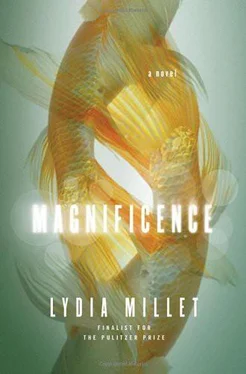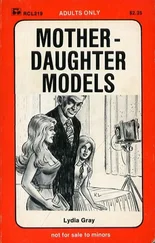“Child’s play,” said the woman. “Leave it to the Yellow Pages and to me. If money is no object?”
“Well, it is an object ,” said Susan, as they started back to the house. She carried the shovel parallel to the ground, trailing clods of earth as they went.

The day of the court date Casey called. It was hard to hear her — a delay in the connection so that their voices often crossed. Susan talked over Casey without meaning to and only heard half of what she was saying.
She was hazy on time zones, but it was so many hours different there that it was almost the same time — was it across the international dateline? She did not know. She strained to hear over a kind of swishing windy sound — the sound of space, she wanted to believe, the sound of the stratosphere, of falling interstellar dust. . though it was probably none of these, it was probably the sound of wires and circuits, metal and fiberglass. Casey was talking about bamboo — something about the properties of bamboo. Bamboo was good, was the gist of what she was saying. She mentioned the Dayak, who were apparently a tribal people. It rhymed with kayak .
Susan pictured them in loincloths, although she had no evidence for this. They would look better in loincloths than she did, that much was certain. Smiling, wearing loincloths, the whole ear thing, and now also carrying bamboo. Possibly in spear form, sharpened at one end, or then, in a more modern context, as strips of light-colored flooring. Bamboo floor coverings were increasingly popular.
Searching for something to prove her own attentiveness, though she could still only half hear, she asked after the other tribal people Casey had written about.
“But how are your friends, the Penan and the Punan Bah?” she asked loudly, enunciating as best she could, though as usual the names made her want to laugh wildly. No offense to the Penan or Punan Bah, she thought, none meant at all, it was the phonetics.
“. . are the Dayak, Mother,” came Casey’s voice.
•
Jim was supposed to meet her outside the court building so she was driving there in her own car. She was nervous, dressed neatly in conservative clothes with pearl earrings and flat, unglamorous heels, and she listened to the radio as she drove — she had always been irritated by NPR, all her adult life, and yet all her adult life she had listened to it faithfully.
One exit’s worth of freeway driving was all it would be: first surface streets, then a mile on the freeway, then surface streets again. And yet as soon as she merged onto the 110—on NPR a well-known interviewer, Terry Gross, was earnestly complimenting a rap musician on his genius — she knew she would never make it. The traffic was stopped, bumper-to-bumper, as far as she could see, though in the opposite direction it was moving freely. Technically it was spring, but the smog was more like summer smog, heat rippling in the dirty air, and a torpor had descended over the long lines of cars. Up ahead people had gotten out of their vehicles and were walking back and forth, some standing aside by themselves and smoking cigarettes, others in groups, talking and gesticulating. It had to be an accident.
She wished she had a cigarette, but then she never bought them herself, only bummed them off Jim. She thought of getting out of her car, like the others, and asking one of the other smokers for one, but then that seemed too disgusting. Anyway she had never liked to get out of her car on the freeway, even when the traffic was bumper-to-bumper and at a dead halt. The concrete had a gray desolation and the air was unbreathable, and she knew a cigarette would seem even viler as soon as she stepped from the car. She waited fifteen minutes with the windows up, cooled by the air-conditioning, glancing frequently at the digital clock on her dashboard, jiggling her foot and occasionally swearing as the minutes ticked away and the hour of the hearing approached. When it was six minutes before the hour she became irritated with Terry Gross, whose earnest tone, it seemed to her, had grown more and more sycophantic. More and more, the intimacy of this trademark Terry Gross tone, as she spoke to the rap star and flattered him several additional times with her eager references to his brilliance and creativity , seemed to suggest that she, Terry Gross, was a longtime proponent and appreciator of rap music and even quite possibly a credentialed expert on the rap-music subject.
The longer Susan listened, becoming increasingly frustrated and impatient, the more it seemed that the impression being conveyed was that she, the white, middle-aged female Terry Gross — unlike she, the white, middle-aged female Susan — was a proud, savvy collective owner of what she lavishly called the rap-music phenomenon. Susan felt resentful of this pandering self-inclusion, of this proprietary, rap-music-savvy, rap-music-loving Terry Gross.
At four minutes till her court date she switched off the radio in a fit of pique and rolled down the windows all the way. Let the heat flow in, she thought, let it boil. The fumes from the idling cars almost choked her but stubbornly she refused to roll up her windows again. Not yet, she thought, not yet. In her annoyance and frustration, her incipient rage, she associated the rolled-up windows and air-conditioning directly with Terry Gross: if she closed the windows again and switched the AC back on it would be necessary to turn the radio back on too, and it would have to be NPR because the commercial stations were all men or products screaming at you, which was even more hateful in this situation of car entrapment than the quiet, earnest, middle-class, educated, and maddeningly empathetic tone of Terry Gross, and so the rolled-up windows meant letting Terry Gross and her sycophantic rap-music interview win.
Three minutes. Two minutes. One. Still no movement. She wished she had a car phone, like T. or probably the rap guy. He certainly had a car phone; most likely he was using said car phone to converse with Terry Gross. Then it was fifteen minutes past, then eighteen, and the tension drained out of her because she had to give up. She had missed it. There was no reason for her to be sitting here anymore, no reason save the obvious fact that she was trapped.
A bearded man in a baseball cap walked by her car and she rolled the window down briefly to ask him if he knew anything. He told her there was a multicar pileup where the 110 merged with the 5. Cars had crashed and people were hurt, he said. “So count your blessings, lady.”
She watched him in the rearview mirror as he continued down the line of cars, slouching, moving so slowly it seemed he felt no urgency at all. He walked like a defeated or dazed person, yet he had spoken sharply. Maybe he had seen something, maybe he was grieving.
When Casey had her accident there were courageous bystanders who went in to help the trapped and wounded victims. One or two of them talked to Hal and Susan later, in the hospital — told how the accident had changed their lives, too, though they had not been physically injured. Some of them never recovered fully, but wrote to Casey and told her how they had cried themselves to sleep at night for months after they came upon the scene.
And they had not been hurt at all.
After the man disappeared from her rearview mirror she surrendered to Terry Gross, surrendered completely. She closed her eyes and listened to the empathetic Terry Gross tone and to the rap-loving earnestness as it flowed over her. I love rap music too , she thought, making a generous gesture. She would reach out to Terry Gross, the rap guy and their mutual passion, thus elevating her own mood. I also find it creative and brilliant, she said in her mind to Terry Gross and the rap guy. It is brilliantly creative, it is creatively brilliant. Not only that, but all of it is brilliant, not just the white-friendly, woman-friendly versions favored by college students but also the gangsta version, the version with bitches, hos and gats, the completely misogynistic, racist, homophobic and violent, even nihilistically brutal version.
Читать дальше













